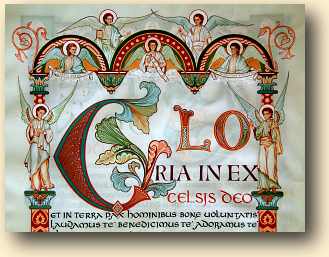
Here's an example from today's Gospel reading.
Ad Majorem Dei Gloriam (To the Greater Glory of God)I'm going to strongly recommend it to you and especially all priests and deacons who have to deliver a homily. If you really really have nothing to say and you're about to start your homily with "I was thinking about whether to have cornflakes or oatmeal for breakfast today and...", then this is the Google group for you.
For: Monday, January 22, 2007
3rd Week in Ordinary Time
Optional Memorial: St Vincent, Deacon and Martyr
From: Mark 3:22-30
Allegations of the Scribes
--------------------------
[22] And the scribes who came down from Jerusalem said, "He (Jesus) is pos-
sessed by Beelzebul, and by the prince of demons He casts out the demons."
[23] And He called them to Him, and said to them in parables, "How can Satan
cast out Satan? [24] If a kingdom is divided against itself, that kingdom cannot
stand. [25] And if a house is divided against itself, that house will not be able
to stand. [26] And if Satan has risen up against himself and is divided, he can-
not stand, but is coming to an end. [27] But no one can enter a strong man's
house and plunder his goods, unless he first binds the strong man; then indeed
he may plunder his house."
Sins Against the Holy Spirit
----------------------------
[28] "Truly, I say to you, all sins will be forgiven the sons of men, and whatever
blasphemies they utter; [29] but whoever blasphemesagainst the Holy Spirit
never has forgiveness, but is guilty of an eternal sin"--[30] for they had said, "He
has an unclean spirit."
************************************************************ ***********
Commentary:
22-23. Even Jesus' miracles were misunderstood by these scribes, who accuse
Him of being a tool of the prince of devils, Beelzebul. This name may be con-
nected with Beelzebub (which spelling is given in some codexes), the name of
a god of the Philistine city of Eqron (Accaron), which means "god of the flies."
But it is more likely that the prince of devils is called Beelzebul, which means
"god of excrement": "excrement" is the word Jews used to describe pagan
sacrifices. Whether Beelzebub or Beelzebul, in the last analysis it refers to
him to whom these sacrifices were offered, the devil (1 Corinthians 10:20). He
is the same mysterious but real person whom Jesus calls Satan, which means
"the enemy", whose dominion over the world Christ has come to wrest from him
(1 Corinthians 15:24-28; Colossians 1:13f) in an unceasing struggle (Matthew
4:1-10; John 16:11). These names show us that the devil really exists: he is a
real person who has at his beck and call others of his kind (Mark 5:9).
24-27. Our Lord invites the Pharisees, who are blind and obstinate, to think
along these lines: if someone expels the devil this means he is stronger than
the devil: once more we are exhorted to recognize in Jesus the God of strength,
the God who uses His power to free man from enslavement to the devil. Satan's
dominion has come to an end: the prince of this world is about to be cast out.
Jesus' victory over the power of darkness, which is completed by His death and
resurrection, shows that the light has already entered the world, as our Lord
Himself told us: "Now is the judgment of this world, now shall the ruler of this
world be cast out; and I, when I am lifted up from the earth, will draw all men to
Myself" (John 12:31-32).
28-30. Jesus has just worked a miracle but the scribes refuse to recognize it
"for they had said `He has an unclean spirit'" (verse 30). They do not want to
admit that God is the author of the miracle. In this attitude lies the special gra-
vity of blasphemy against the Holy Spirit--attributing to the prince of evil, to
Satan, the good works performed by God Himself. Anyone acting in this way
will become like the sick person who has so lost confidence in the doctor that
he rejects him as if an enemy and regards as poison the medicine that can
save his life. That is why our Lord says that he who blasphemes against the
Holy Spirit will not forgiven: not because God cannot forgive all sins, but be-
cause that person, in his blindness towards God, rejects Jesus Christ, His
teaching and His miracles, and despises the graces of the Holy Spirit as if
they were designed to trap him (cf. "St. Pius V Catechism", II, 5, 19; St.
Thomas Aquinas, "Summa theologiae", II-II, q. 14, a. 3).
The Navarre Bible: Text and Commentaries". Biblical text from the\nRevised Standard Version and New Vulgate. Commentaries by members of\nthe Faculty of Theology, University of Navarre, Spain.\n\nPublished by Four Courts Press, Kill Lane, Blackrock, Co. Dublin, Ireland.\nReprinted with permission from from Four Courts Press and Scepter Publishers,\nthe U.S. publishers.\n\nThe "Navarre Bible: Text and Commentaries" is available from: Scepter Publishers:\nhttp://www.scepterpublishers.org/category-exec/category_id \n\n"Ignorance of Scripture is ignorance of Christ." -- St Jerome\n\n"The Father uttered one Word; that Word is His Son, and He utters Him for ever in\neverlasting silence: and in silence the soul has to hear it. -- St John of the Cross/7/nm/Navarre_Bible
Source: "The Navarre Bible: Text and Commentaries". Biblical text from the
Revised Standard Version and New Vulgate. Commentaries by members of
the Faculty of Theology, University of Navarre, Spain.
Published by Four Courts Press, Kill Lane, Blackrock, Co. Dublin, Ireland.
Reprinted with permission from from Four Courts Press and Scepter Publishers,
the U.S. publishers.
The "Navarre Bible: Text and Commentaries" is available from: Scepter Publishers:
http://www.scepterpublishers.org/category-exec/category_id /7/nm/Navarre_Bible
"Ignorance of Scripture is ignorance of Christ." -- St Jerome
"The Father uttered one Word; that Word is His Son, and He utters Him for ever in
everlasting silence: and in silence the soul has to hear it. -- St John of the Cross
Here's how to get it.
First, you've got to have a Gmail account.
Log on and go click on this link http://groups-beta.google.com/group/dailyword and sign on.
That's it.
If you can afford it, by all means get the whole set. But if you can't, then this is the best alternative.
Thanks to Mike Harrison for running such a great group and providing an invaluable service to all God's people.
![[Unam Sanctam]](https://blogger.googleusercontent.com/img/b/R29vZ2xl/AVvXsEiymQ2adTjpZ1ABhPBbBBquiPCxeQrc4Jy_97vOikT0wGQeJleriiXQy6ebnb0jrYe-TfvcK77txStB4aIwVAdD41ZdMkVfNtFGC0JX6LBV9B8mfeRZaIAM7Sj-011ag3DiKQzv/s1600/headerdivinemercy.jpg)



































































2 comments:
hehe.. i wished i could afford these navarre series. A wonderful addition to my shelves.. but for now, i guess reading it on the net would do.. thx for the info. God bless...
Yup, I'm also broke, so this would have to suffice
Well, God has been kind enough to put this in my way.
Baruch haShem Adonai Eloheynu!
And God bless Brian Harrison as well. =)
Post a Comment